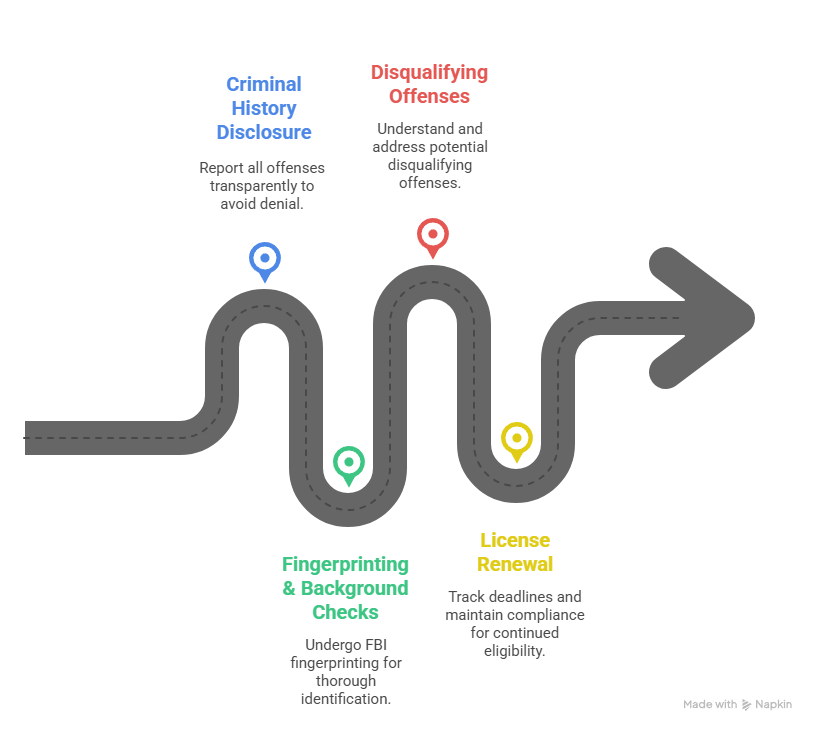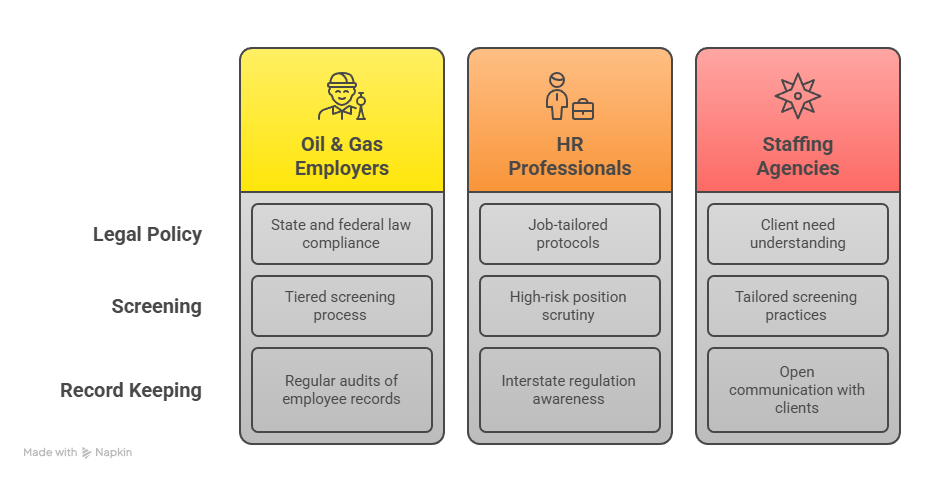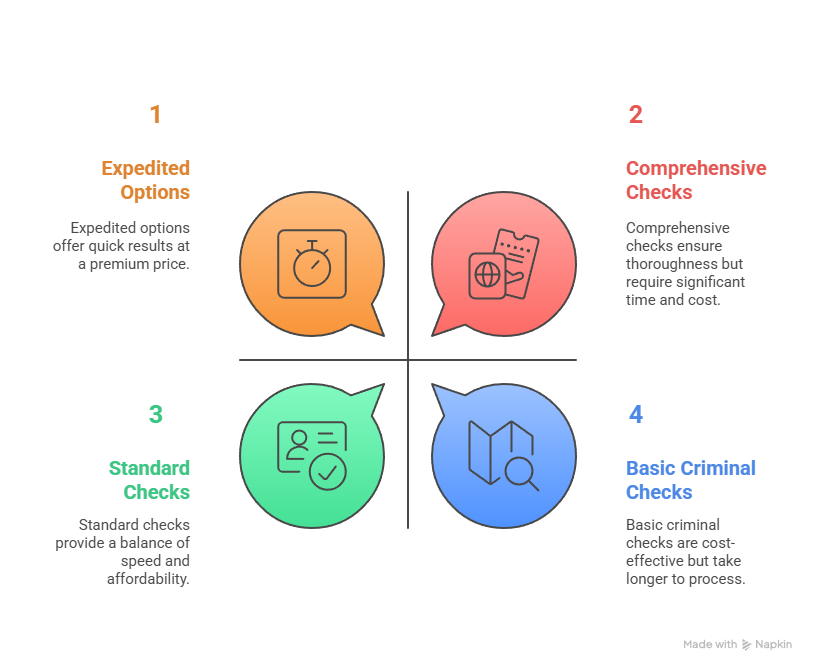In this article, we'll tackle the intricate landscape of background checks in the Texas oil and gas industry. With Texas making up a staggering 40% of U.S. oil production, compliance with strict safety regulations is crucial for both employers and job seekers. This outline provides a clear pathway through essential regulations from the TDLR, OSHA, and the Railroad Commission. Employers, HR teams, and potential employees will find valuable insights for navigating these requirements to avoid compliance mishaps.
Key Takeaways
- Texas dominates U.S. oil production, leading to complex regulatory compliance that industry players must navigate.
- Main regulatory bodies including TDLR, RRC, and OSHA enforce varied safety and licensing rules critical for operations.
- Thorough background checks are imperative for safety-sensitive roles to avoid compliance pitfalls and ensure public safety.
- Understanding specific state and federal regulations helps prevent legal issues and enhances operational success.
- Regular updates and continuous education on regulatory changes are crucial for maintaining industry compliance.
Introduction
Texas provides around 43% of America's crude oil, and as such, Texas is America's energy giant and the globe's oil capital (U.S. Energy Information Administration [EIA], 2024). With this dominance comes the weight of regulatory responsibilities. Safety, compliance, and transparency are not mere checkboxesâÂÂthey are imperatives. In this article, you'll find guidance on navigating the Texas Department of Licensing and Regulation (TDLR), OSHA, and the Railroad Commission rules.
Here's a glimpse of our journey: We'll start with Texas's licensing requirements, cover federal compliance obligations, and explore the complexities of state versus federal regulations. For those in safety-sensitive positions, understanding these rules isn't optional. Employers must avoid compliance pitfalls to protect their operations and workforce.
Questions about navigating this regulatory maze are common. You might wonder how to handle overlapping laws or prevent violations. Consider this your roadmap. Our goal is to equip you with the knowledge to manage the intricacies of compliance in the Texas oil and gas industry. Let's tackle these challenges together.
I'm here to better HR practices for hazardous work. I've learned that background checks aren't about rule-followingâÂÂthey are about ensuring people are safe, gaining their trust, and offering them a second chance. For work involving hazardous machines, hazardous zones, or work that compromises safety, we must be thoughtful about these initiatives for the benefit of all. In addition to the risk, I've encountered people who simply wanted someone to believe their lives could become better. You begin with transparency, candor, and offering second chances. We are not merely reviewing resumesâÂÂwhat we are doing is building safe, strong, and inclusive workplaces for all.
Texas Oil & Gas Regulatory Landscape Overview

Navigating the regulatory landscape in the Texas oil and gas industry isn't just a taskâÂÂit's a necessity. Three main bodies govern this industry: the Texas Department of Licensing and Regulation (TDLR), the Texas Railroad Commission (RRC), and the Occupational Safety and Health Administration (OSHA).
Key Regulatory Bodies
Understanding which bodies govern the Texas oil and gas industry is crucial for smooth operations. The Texas Department of Licensing and Regulation (TDLR) is your primary contact for licenses. Whether you're dealing with electricians, plumbers, or HVAC specialists, TDLR dictates the qualifications necessary to work legally in the state. Expect stringent checks to validate credentials and ensure compliance with Texas standards.
The Texas Railroad Commission (RRC) plays a pivotal role too. It oversees everything from well drilling to production, making sure operations run safely and adhere to state regulations. If your project involves well work, RRC regulations serve as your guide.
Safety comes under the lens of the Occupational Safety and Health Administration (OSHA). Federal laws mandate thorough Texas oil and gas background checks for safety-sensitive positions, particularly those involving hazardous materials or complex machinery. Staying on top of OSHA's requirements can help prevent costly compliance mishaps.
For those involved in transportation, the Department of Transportation (DOT) rules apply. The DOT focuses on pipeline safety and demands rigorous screening for workers. Meeting these expectations is non-negotiable for maintaining both safety and legality in transit operations.
Are you confident youâÂÂre meeting these rigorous standards? Consider regular training sessions and compliance audits to stay ahead. These steps could be the difference between a smooth inspection and an operational halt. Keeping updated on these bodies' regulations not only ensures compliance but can also provide a competitive edge in the market.
Why Background Checks Are Critical
Background checks hold a central role in the Texas oil and gas industry. This isn't just about ticking boxesâÂÂit's about safety. The industry involves high-risk environments where one mistake can lead to serious accidents. When you're responsible for employing people to handle heavy machinery or work in potentially hazardous settings, knowing their past is crucial. For instance, a worker with a history of negligent behavior could pose significant risks on an oil rig.
Operating across state lines means federal compliance gets involved. The good news is that thorough background checks can ensure you meet interstate operation standards. By doing so, you keep the business on the right side of the law and avoid costly fines.
Insurers and liability play a role too. They expect companies to ensure new hires meet strict guidelines, which can impact your insurance premiums. They're essentially looking for you to lessen risk in risky business.
Public safety and environmental protection are non-negotiable, especially when you consider the potential consequences of non-compliance. Imagine the fallout from a spill due to a preventable error. Your responsibility extends beyond the workforce to the environment and local communities. By conducting background checks, you protect all stakeholders and bolster the reputation of your business.
Common Misconceptions
Background checks in the oil and gas industry can be tricky. One common misconception is that state and federal regulations are always in sync. They're not. Texas regulatory bodies like the TDLR and RRC have their own sets of rules, which sometimes overlap but often diverge from federal guidelines like those from OSHA or the DOT. You might think a single background check will cover all bases, but that's rarely the case.
Another misunderstanding is the idea that there's a one-size-fits-all compliance solution. Each role has unique requirements depending on the work environment and specific job duties. A driller might face different background scrutiny compared to an office-based technician. Understanding these differences is crucial, especially when federal laws come into play. If an operation crosses state lines, federal guidelines often take precedence, adding another layer of complexity.
It's easy to assume that background checks are simply about criminal history, but that's only part of it. Factors like past work performance and even educational history can play a role, especially for safety-sensitive jobs. Liabilities for non-compliance can be heavy, including fines or restrictions on operations. Keeping track of these nuances can save you headaches and potential legal issues down the line.
Have you double-checked how current your compliance procedures are? It might be worthwhile to revisit them. They should align with both state and federal laws, and be tailored to suit the roles being filled. Going beyond basic criminal checks, and understanding your specific regulatory environment, will help keep your operations compliant and safe.
TDLR Background Check Requirements
Licensed Positions Requiring Checks
In the Texas oil and gas sector, specific roles demand TDLR licensing and associated background checks. For instance, electricians in oil fields must undergo checks to ensure they meet safety and performance standards. Similarly, boiler operators require a license for their expertise in managing high-pressure systemsâÂÂa task with significant safety concerns. Elevator inspectors, often overlooked, play a critical role in maintaining equipment safety.
Performing these Texas oil and gas background checks isn't merely bureaucratic. The stakes are high due to potential safety risks. You need to ensure these professionals are clean from criminal activities that might impact their job performance. Take the example of an electrician with a record of negligence or substance abuse. Allowing them onto a site without thorough vetting could mean disaster.
Adhering to TDLR regulations not only safeguards operations but also protects employees and the public. The checks filter out individuals who may not uphold safety standards, which is paramount in high-risk environments. Being proactive about these checks helps companies avoid costly mishaps and legal entanglements down the line.
Are you confirming each role's compliance with the necessary checks? Make it a routine part of your HR process to align with TDLR mandates. This diligence pays off in creating safe and efficient work sites.
TDLR Application Process

When you apply for a position requiring a TDLR license, there are several steps you'll need to follow. First, you'll need to disclose any criminal history. The TDLR requires complete transparency, so it's vital to report all offenses, even if they seem minor or were resolved years ago. Skipping this step can lead to denial of your application.
Next comes fingerprinting. The TDLR uses this to conduct a thorough background check. Many people ask why fingerprinting is necessary. It's simpleâÂÂfingerprints provide a more accurate way to identify criminal records across states and federal databases.
The process also involves an FBI background check. This might sound intense, but it's standard practice. The FBI check looks for any serious offenses that could impact your ability to perform your job safely and responsibly.
Certain offenses will automatically disqualify you from gaining a license. If you have a conviction for a violent crime or fraud, for instance, you'll likely face rejection. However, there's room for appeal. If your offense is old and you've shown rehabilitation, you might have grounds for reconsideration. Understanding the appeal process can open doors that seemed shut.
Renewal is another essential part of maintaining your license. Keeping track of renewal deadlines and staying compliant with TDLR requirements ensures you remain eligible for employment in this high-stakes industry.
Remember, each step in this process holds its own importance. Being prepared and understanding each stage can help you avoid unnecessary delays or complications. If you feel stuck, consider consulting with a legal professional for guidance. Their insights could provide the clarity you need to move forward confidently.
Industry-Specific Considerations
When dealing with the TDLR background check requirements, certain industry-specific factors come into play. If you're operating in the Texas oil and gas sector, these considerations can significantly influence your compliance approach.
Many oil and gas companies operate across multiple states. If this applies to you, be aware that Texas isn't the only jurisdiction dictating your actions. Federal requirements, such as those from the Department of Transportation, may also demand your attention, particularly for roles involving interstate transportation of hazardous materials. It's essential to factor in these additional layers of compliance when conducting Texas oil and gas background checks.
Multi-state licensing can also complicate matters. For instance, electricians working on oil rigs might need certification in several states. This means background checks might not only need to meet Texas standards but also the standards of other states where operations occur. Ensuring your team is compliant with the most stringent rules can save time and frustration.
Temporary worker provisions are another area to consider. The oil and gas sector often relies on a transient workforce, especially during peak periods. Short-term or project-based roles can require an expedited background check process that might differ from standard procedures. Such requirements may necessitate strategic planning to ensure checks are thorough yet timely, allowing for quick yet compliant onboarding.
When handling these considerations, ask yourself: "Are my background check processes built to handle federal demands alongside state-specific ones?" This approach ensures you cover all bases, providing a comprehensive safety net for your operations.
OSHA and Federal Safety Requirements
OSHA's role in the Texas oil and gas industry is crucial. It sets standards that protect workers in high-risk environments. For starters, Process Safety Management (PSM) standards require a firm grip on Texas oil and gas background checks for those in safety-sensitive positions. This isn't just about ticking boxesâÂÂit's about ensuring every team member is up to the task.
Process Safety Management (PSM) Standards
Understanding OSHA's Process Safety Management (PSM) standards is vital in the oil and gas sector. The high-risk nature of this industry means you need rigorous safety protocols in place. PSM serves as a framework aimed at preventing accidental releases of substances that can cause serious harm. This involves implementing safety measures in handling hazardous chemicals. Your workforce plays a crucial role here, and background checks are a critical part of this process.
Background checks help identify candidates who are fit for roles in safety-sensitive environments. They allow you to assess whether employees or contractors have the required qualifications and history to handle essential safety tasks effectively. These checks focus on verifying criminal history, professional credentials, and sometimes drug testing, ensuring only qualified personnel manage high-risk operations.
Differences often arise between screenings for contractors and employees. Contractor checks might be less comprehensive, focusing more on safety certification and less on full background histories. Employees, on the other hand, may undergo more extensive scrutiny to align with company policies or PSM standards.
The importance of these checks can't be understated. Mishandling of hazardous substances can lead to catastrophic incidents. Ensuring that the right people are in place minimizes human error and enhances overall safety. Are you confident that your current screening process aligns with PSM requirements? Regularly reviewing and updating your protocols ensures compliance and safety.
Implementing a robust background check procedure as part of PSM standards fosters a culture of safety and accountability. By doing so, you not only comply with OSHA regulations but also protect your workforce and the surrounding community.
OSHA 1910.119 Compliance
You must ensure your workforce meets OSHA's 1910.119 standards. This regulation targets facilities managing hazardous chemicals, focusing heavily on safety and operational integrity. Texas oil and gas background checks form a crucial part of compliance, confirming that personnel handling sensitive tasks are qualified and reliable.
Verify employee qualifications through detailed screening processes. This includes checking past employment, certifications, and any criminal history relevant to safety-sensitive positions. For instance, a process operator in a refinery must not only be skilled but also carry a clean record that assures they won't jeopardize operational safety.
Documentation is your shield during audits. Keep meticulous records of your employees' training, qualifications, and dates of background checks. During a compliance check, missing paperwork can lead to penalties. These records demonstrate you hire competent individuals, reinforcing workplace safety.
Ask yourself if your current employee screening aligns with OSHA's strict requirements. Are your records up-to-date and well-organized? Is your training documentation thorough enough to pass an audit? Regularly review and update your processes to keep your operation within legal boundaries and safe from unexpected liabilities.
Hazardous Material Handling
Handling hazardous materials in the oil and gas industry requires adherence to specific screening protocols. The Hazardous Materials Regulations (HMR) are a cornerstone for ensuring the safety of workers managing these substances. A critical part of this is the HAZMAT endorsement, necessary for anyone involved in the transportation of dangerous goods. This endorsement is not just a box-ticking exercise; it demands a diligent background check focused on security assessments.
You might wonder, what's involved in obtaining this endorsement? First, there's the rigorous screening process. It includes a thorough review of your criminal history and any prior incidents concerning hazardous materials. These background checks can flag individuals with convictions related to violence or substance abuse, which could pose a risk when managing sensitive materials.
How does this impact you? If you're a job seeker, it's crucial to be prepared for these checks. Ensure all your documentation is accurate. Misrepresentations can lead to delays or disqualifications. For employers, it's vital to have a robust screening system in place. Missing a required HAZMAT check can not only lead to fines but can also compromise safety on-site.
Reflecting on two decades in this field, I've witnessed companies face compliance headaches simply because they skipped due diligence in background checks. The solution? Regularly review and update your screening processes. Consult with experts to ensure your procedures adapt to regulatory updates. Taking these proactive steps protects your workforce and upholds the integrity of your operations.
Texas Railroad Commission Background Check Rules
For anyone involved in the Texas oil and gas industry, understanding the Texas Railroad Commission (RRC) rules is essential. The RRC oversees the extraction, production, and transportation aspects of oil and gas. Each phase requires a solid background screening to ensure compliance and safety.
| Category | Details |
|---|---|
| Well Drilling Operations | Licensed drillers and screened crew members required. Background review for disqualifying offenses like environmental violations. Hiring unvetted individuals can halt operations and lead to penalties. |
| Production and Transportation | Pipeline workers must meet strict standards. Checks for drug use and alcohol abuse in safety-sensitive roles. Up-to-date compliance protocols essential to catch red flags. |
| Reporting and Documentation | Accurate records of all background screenings and compliance checks required. Failure to maintain proper documentation results in hefty fines and operational bans. Records must be audit-ready. |
Are you confident that your records would hold up under inspection? If not, consider an attentive review of your current practices. Address any weaknesses immediately to avert future troubles. Accurate documentation is not just about compliance; it's a foundation for sustaining operations effectively and transparently.
Industry Best Practices and Compliance Strategies

For Oil & Gas Employers
To keep your operations running smoothly in the Texas oil and gas sector, compliance with background check requirements is not just smart; it's essential. Start by creating a comprehensive screening policy. It should cover state and federal regulations for every role in your company, from entry-level to senior leadership.
Ensure your strategy is proactive rather than reactive. Pre-employment screening isn't enough. Establish a system for routine checks, especially for safety-sensitive positions. This can prevent compliance issues and enhance workplace safety. Remember, consistent checks help maintain trust with stakeholders and uphold public safety standards.
Use technology to streamline the process. Digital platforms can offer solutions for keeping track of compliance documents, screening results, and renewals. This helps save time and reduces errors.
Consider the impact of multi-jurisdictional operations. If your company operates across state lines, adapt your policies to match varying local regulations. This minimizes the risk of oversight.
Keep communication channels open with your HR team. Regular training sessions can keep everyone updated on regulatory changes and best practices. Engage them in policy updates to reflect current laws.
Think about your company culture. Promote an environment where compliance is part of the daily routine. This approach can lead to fewer headaches with paperwork and more focus on productive work.
Finally, evaluate your compliance measures periodically. Is your screening policy effective? Are there areas for improvement? These check-ins can help keep your strategies fresh and aligned with the latest requirements.
For HR Professionals
Managing compliance in the oil and gas industry requires more than just understanding state and federal guidelines. You need to tailor your policies to align with the specifics of each position. Differentiating between roles is a mustâÂÂwhat a rig operator needs versus an administrative position varies greatly. YouâÂÂll want to start with role-specific compliance protocols. For example, those in high-risk roles might need more intensive background screening compared to others.
Interstate compliance adds another layer of complexity. If your company operates across state lines, you need to adapt to varying legal requirements. This means staying informed on both Texas laws and federal regulations. Regularly update your compliance checklists and consider participating in industry groups that focus on these issues.
Planning your strategy involves setting up a robust pre-employment screening process. But donâÂÂt stop there. Continuous monitoring post-hire is equally important. This ongoing process helps catch issues before they escalate into compliance breaches.
DonâÂÂt underestimate the power of good documentation. Keep meticulous records of all screenings and follow-up actions. This serves not only in preventing compliance issues but also proves crucial during audits. Ensure your team understands the importance of maintaining these records accurately.
Tackling these tasks might seem daunting, but they are essential in reducing the risks of fines and liabilities. Effective compliance management protects both your company and its workforce, ensuring a safer operational environment.
For Staffing Agencies
Navigating background checks for the oil and gas sector in Texas is a critical facet for staffing agencies. You're in a position to offer significant value to your clients by managing their compliance needs effectively. Start by understanding their specific background check requirements. Each client will have different compliance needs based on the roles they are staffing. These can range from general safety positions to highly specialized engineering roles.
Develop a systematic approach for screening candidates. This includes setting up procedures for federal, state, and local checks. Ensure your process aligns with the regulations set by TDLR, OSHA, and the Railroad Commission. For instance, electricians might require specific licenses and clearances before they can step onto a worksite.
Maintain up-to-date records of all screenings and be prepared for audits. Good documentation practices not only help avoid compliance issues but also build trust with your clients. Make sure that your screening process can handle the nuances of multi-jurisdictional regulations, especially if your clients operate across state lines.
Consider leveraging technology to streamline your tasks. Automated systems can track application statuses, alert you to renewals, and ensure continuous monitoring of employees. This saves time and reduces human error, enabling your team to focus on finding the right candidates.
Remember, the stakes are high in the oil and gas industry; a lapse in screening can result in significant financial and reputational damage. Keep communication lines open with both clients and candidates to ensure transparency and trust. How are you ensuring your processes meet legal requirements and protect all involved parties? Craft your strategy to answer this question confidently and competently.
Common Disqualifying Factors and Exceptions
Automatic Disqualifiers
In the oil and gas industry, automatic disqualifiers are significant due to the high-risk nature of the work. Violent crimes are a major red flag; employers prioritize safety and usually wonâÂÂt take chances with individuals who have a history of violence. Substance abuse is another critical concern. Oil and gas operations often involve heavy machinery and hazardous materials, leaving no room for errors related to impairment. Fraud and financial crimes also raise issues, particularly in roles that involve sensitive data or financial transactions. Lastly, terrorism-related activities can immediately disqualify an applicant given the national security implications.
Case-by-Case Evaluations
Some factors require a closer inspection rather than immediate disqualification. Rehabilitation efforts can be considered if the applicant has demonstrated genuine change and the offense happened a long time ago. The nature of the crime relative to the job is also evaluated; an old misdemeanor unrelated to the job duties might not outweigh an applicantâÂÂs qualifications. Additionally, federal and state standards can differ, necessitating a careful balance. In some cases, an offense might bar employment at a federal level but not at the state level.
Appeal and Waiver Processes
The appeal and waiver process can offer a path forward if you face disqualification. The Texas Department of Licensing and Regulation (TDLR) allows applicants to appeal their disqualification decisions. This can involve presenting evidence of rehabilitation or other mitigating factors. Similarly, some federal processes allow exception requests based on specific circumstances. Legal representation can be beneficial throughout these procedures, providing guidance and potentially increasing the chance of a favorable outcome. As always, having thorough documentation and understanding the specific requirements of the job can help make a strong case.
Remember, proactive communication is key. Reach out to the relevant regulatory body to ensure you're compliant with all procedural requirements and are informed about timelines and expectations. Forging ahead with knowledge and advocacy can change the outcome significantly.
Job Seeker Guide: Navigating Texas Oil & Gas Background Checks

Preparing for Background Screening
The anticipation of a background check can be daunting, but preparation sets you up for success. Start with gathering your documentation. Have your employment history, identification, and professional references ready. Disclose any past issues proactively â honesty goes a long way. Fingerprints and criminal history will likely be part of the process, so be straightforward about them. Past mistakes don't have to derail your future in this industry.
Understanding Your Rights
ItâÂÂs crucial to know your rights under the Fair Credit Reporting Act (FCRA). Companies must inform you if a background check is part of the application process and get your written consent. If the information from a check could impact a job offer, they must notify you and provide a copy of the report. You have the right to dispute inaccuracies. The process ensures transparency and gives you a chance to address concerns before decisions are made.
Career Planning with Background Issues
A problematic record doesnâÂÂt mean the end of the road. Focus on companies known as second chance employers who consider candidates with past offenses. Invest in skill development to strengthen your profile. Certifications and training in oil and gas are valuable; they can demonstrate your dedication and help offset concerns about your background. Networking within the industry can also open doors otherwise closed by a check. Always aim to present yourself as a proactive, reliable candidate.
Cost and Timeline Considerations
When it comes to background checks in the Texas oil and gas industry, timing and cost are crucial factors. Understanding the investment involved is essential for both employers and job seekers.

Typical Processing Times
When you're navigating background checks in the Texas oil and gas industry, understanding processing times can help manage expectations. For TDLR licenses, you're looking at around two to three weeks, provided all documents are in order and no hiccups occur. Delays often come from missing information or fingerprint issues. For federal checks, such as FBI fingerprint checks, timelines stretch to four to six weeks due to their complex nature. If you're in a rush, expedited processing is sometimes an option but can cost a pretty penny. Always plan ahead to avoid disruptions in your hiring or licensing processes. From your experience, what has been the most challenging timeline to deal with?
Cost Breakdown by Check Type
Understanding the costs associated with background checks is critical for managing budgets effectively. In Texas's oil and gas sector, the type of check required often dictates the price. A basic criminal background check can range from $20 to $50 per individual. This type is typically suitable for positions with no or low security clearance.
For more comprehensive checks that include employment verification, education verification, and driving records, costs can climb to $100 to $200 per person. These checks are common for safety-sensitive roles in the industry, like machine operators and transportation workers, where compliance and candidate integrity are crucial.
Fingerprint-based checks, often required for handling hazardous materials or fulfilling Occupational Safety and Health Administration (OSHA) mandates, might cost between $50 and $150. These checks might involve additional fees for rapid processing or extensive geographic searches.
Drug testing, a frequent requirement for many roles to ensure a safe work environment, typically ranges from $30 to $60 for standard panels. Enhanced panels, which test for a broader range of substances, can increase this cost.
You must also consider the administrative fees charged by background check agencies. These can vary based on the volume of candidates screened and the complexity of the checks required. For high-volume hiring, negotiating package rates can result in significant savings.
Comprehensive background checks are an investment in safety and compliance that help avoid costly fines and mitigate risks. Allocating the proper budget towards these checks will not only protect your company but also ensure the reliability and safety of your workforce. How does your current approach to background checks measure up? Are there areas where costs could be streamlined while maintaining compliance?
ROI and Compliance Value
Compliance isn't just about avoiding fines. It's about maintaining a safe and reputable workforce. The return on investment for thorough background checks can be substantial. Think about the cost of not checking past records. Hiring someone with a undisclosed history of unsafe practices could lead to accidents on site. Accidents mean downtime, legal issues, and potential reputational damage.
Investing in proper checks can help you hire responsibly. This means fewer incidents, which translates to lower insurance premiums and more contracts won because clients trust your operations. Good compliance practices boost morale, as employees feel safer when they know that their colleagues are vetted. Plus, the workforce becomes more reliable, leading to improved productivity.
Don't aim to cut corners to save a dime on background checks. The risks far outweigh the savings. Integrating robust checks into your hiring process is essential for any responsible operator in the Texas oil and gas industry. What steps are you taking to ensure compliance adds real value to your operations?
Conclusion
For those involved in Texas oil and gas operations, staying informed about these changes is crucial. Regular updates and continuous learning will help you maintain compliance and take advantage of new technologies that enhance the efficiency of background screenings. How will your organization adapt to these impending changes? It might be time to reassess your current strategies and prepare for a more digitized future.
Staying compliant in the Texas oil and gas industry isn't just about following rulesâÂÂit's about being informed and proactive. The dynamic landscapes of TDLR, OSHA, and the Railroad Commission overlap and intersect in ways that can catch you off guard if you're not vigilant. To steer clear of pitfalls, keeping up with regulatory updates is non-negotiable. Make it a habit to visit relevant websites frequently. Consider subscribing to industry newsletters that provide insights into upcoming legislative changes and standards.
Consultation with legal and compliance professionals can help you navigate complex scenarios. They can offer tailored advice to suit your specific situation. It's also worth attending workshops and seminars focused on compliance strategies. These events often provide actionable insights and networking opportunities that could be beneficial.
Utilizing specialized software can also streamline compliance efforts. Modern tools can help manage documentation and automate parts of the compliance process, making it easier to adhere to regulations without drowning in paperwork. Investing in these resources can offer significant returns, both in compliance and operational efficiency.
Remember, compliance isn't a one-time taskâÂÂit's an ongoing commitment. Regular training sessions for your team can ensure everyone is up-to-date with the latest requirements and safety practices. Empower them with knowledge and tools, not just to meet standards, but to exceed them.
Frequently Asked Questions
What does a Texas background check look for?
A Texas background check usually reviews criminal history, employment history, education verification, and sometimes credit history. It can also include driving records and professional license verification if relevant to the job.
How long does it take for a Texas background check?
A Texas background check typically takes anywhere from a few days to a week. The time can vary depending on the depth of the check and the processes of the organization conducting it.
What is the background check policy in Texas?
In Texas, employers can request background checks as part of the hiring process, but they must comply with federal laws like the Fair Credit Reporting Act (FCRA). This includes obtaining written consent from the job applicant.
How far back can an employer do a background check in Texas?
Employers in Texas can usually check criminal history as far back as needed. However, for credit history and certain other information, the FCRA limits the report to seven years unless the job has a salary over $75,000.
What is the 7-year rule on background checks in Texas?
The 7-year rule generally limits reporting of civil suits, civil judgments, and records of arrest from showing up on background checks after seven years, although this does not apply to criminal history.
What background check do most employers use?
Most employers use comprehensive background checks that include criminal history, employment verification, and education records. Some may also include credit checks and driving records depending on the job requirements.
How do I get my Texas background check?
You can request your background check from the Texas Department of Public Safety or use a reputable online background check service. You'll need to provide identification and possibly a fingerprint sample.
Can you be denied a job because of your background check in Texas?
Yes, employers can deny employment based on information found in a background check. However, the decision must be job-related and consistent with business necessity. You should be informed if this is the reason for denial.
Does a Texas background check include social media activity?
Usually, Texas background checks do not include social media activity unless explicitly part of the screening process. Some employers may review public social media profiles separately as part of their assessment.
Are there restrictions on using arrest records in Texas for employment decisions?
Yes, Texas employers cannot use arrest records alone to deny employment. Arrests that did not lead to a conviction should not be the sole basis for disqualifying a candidate from a job opportunity.
Additional Resources
- Texas Updates Oil & Gas Waste Rules After 40 Years - National Law Review
https://natlawreview.com/article/texas-railroad-commissions-new-environmental-rules-step-toward-sustainability-or - Myth vs Fact - Texas Oil & Gas Association
https://www.txoga.org/myth-vs-fact/ - Texas oil companies face new deadlines to plug inactive wells - Texas Tribune
https://www.texastribune.org/2025/05/27/texas-oil-gas-abadoned-wells-regulations/ - RRC Adopts Major New Oil and Gas Waste Management Rules - Railroad Commission of Texas
https://www.rrc.texas.gov/news/121724-rrc-adopts-major-new-oil-and-gas-waste-management-rules/ - Occupational Safety and Health Administration. (n.d.). Oil and gas extraction: Standards. U.S. Department of Labor. https://www.osha.gov/oil-and-gas-extraction/standards
- Thweatt, T. (n.d.). OSHA compliance and safety for refinery workers. Terry Bryant Law Firm. https://www.terrythweatt.com/library/osha-compliance-safety-refinery-workers.cfm
- U.S. Energy Information Administration. (2024). Texas state energy profile. https://www.eia.gov/state/print.php?sid=TX

GCheck Editorial Team
Meet the GCheck Editorial Team, your trusted source for insightful and up-to-date information in the world of employment background checks. Committed to delivering the latest trends, best practices, and industry insights, our team is dedicated to keeping you informed.
With a passion for ensuring accuracy, compliance, and efficiency in background screening, we are your go-to experts in the field. Stay tuned for our comprehensive articles, guides, and analysis, designed to empower businesses and individuals with the knowledge they need to make informed decisions.
At GCheck, we're here to guide you through the complexities of background checks, every step of the way.







